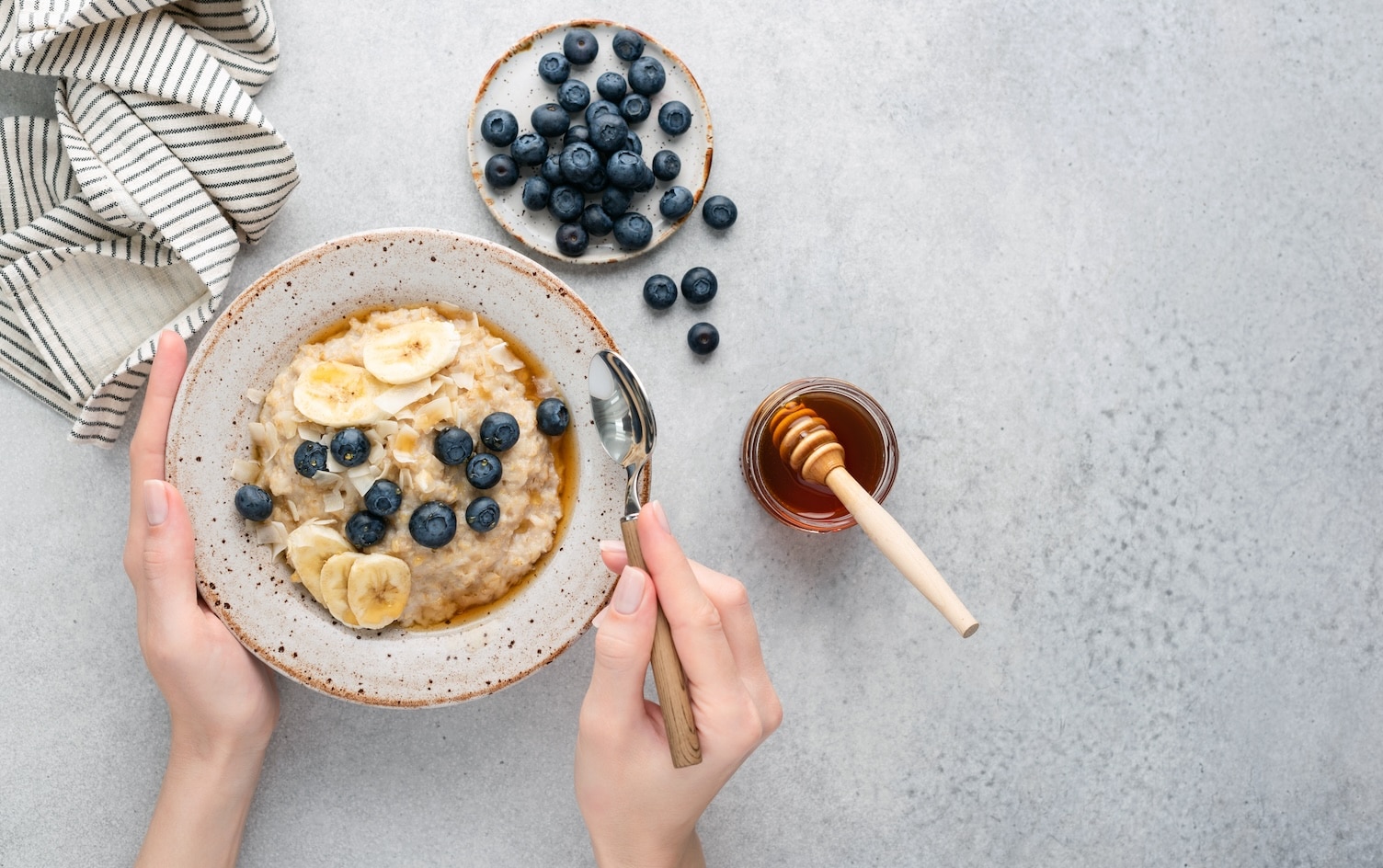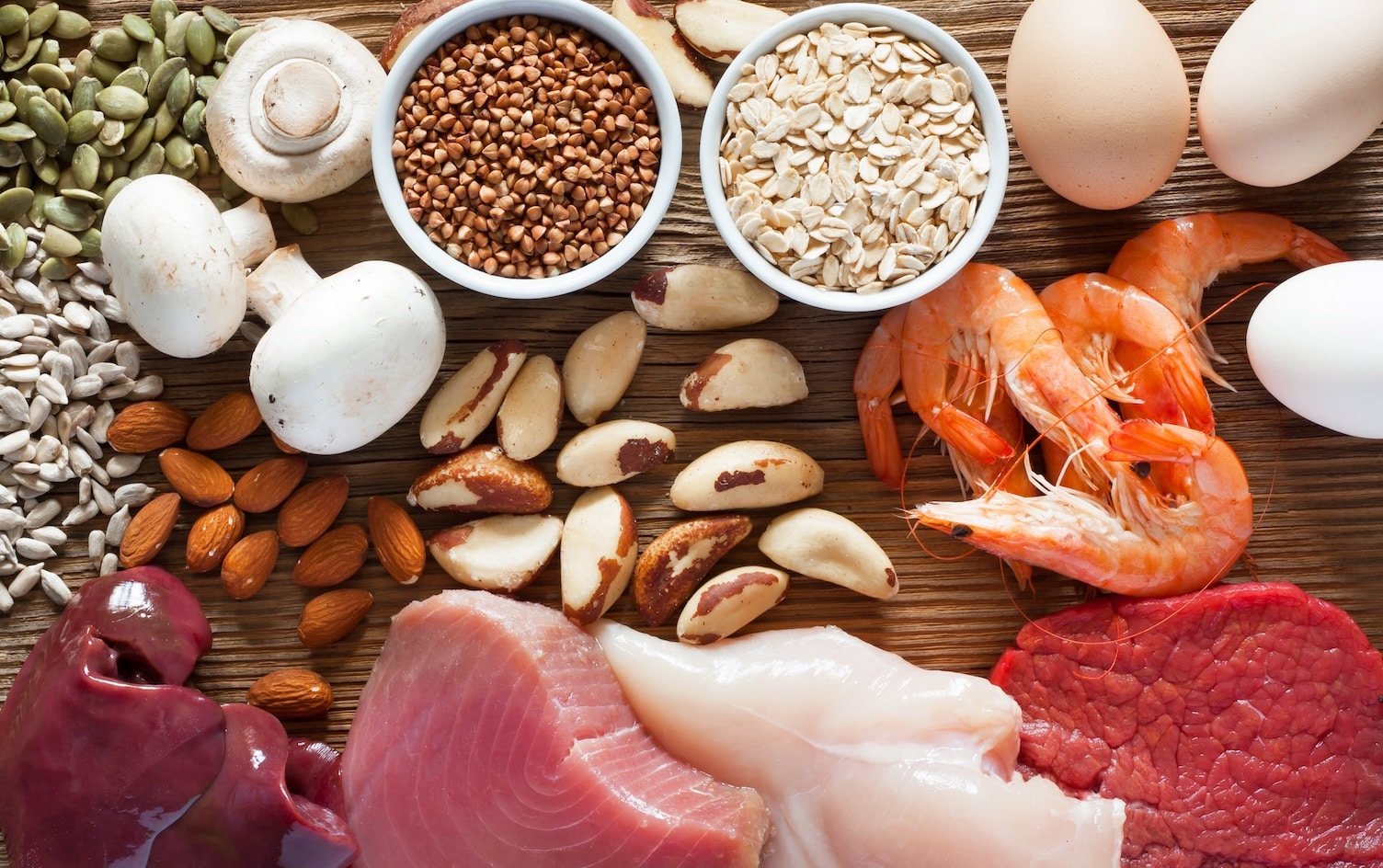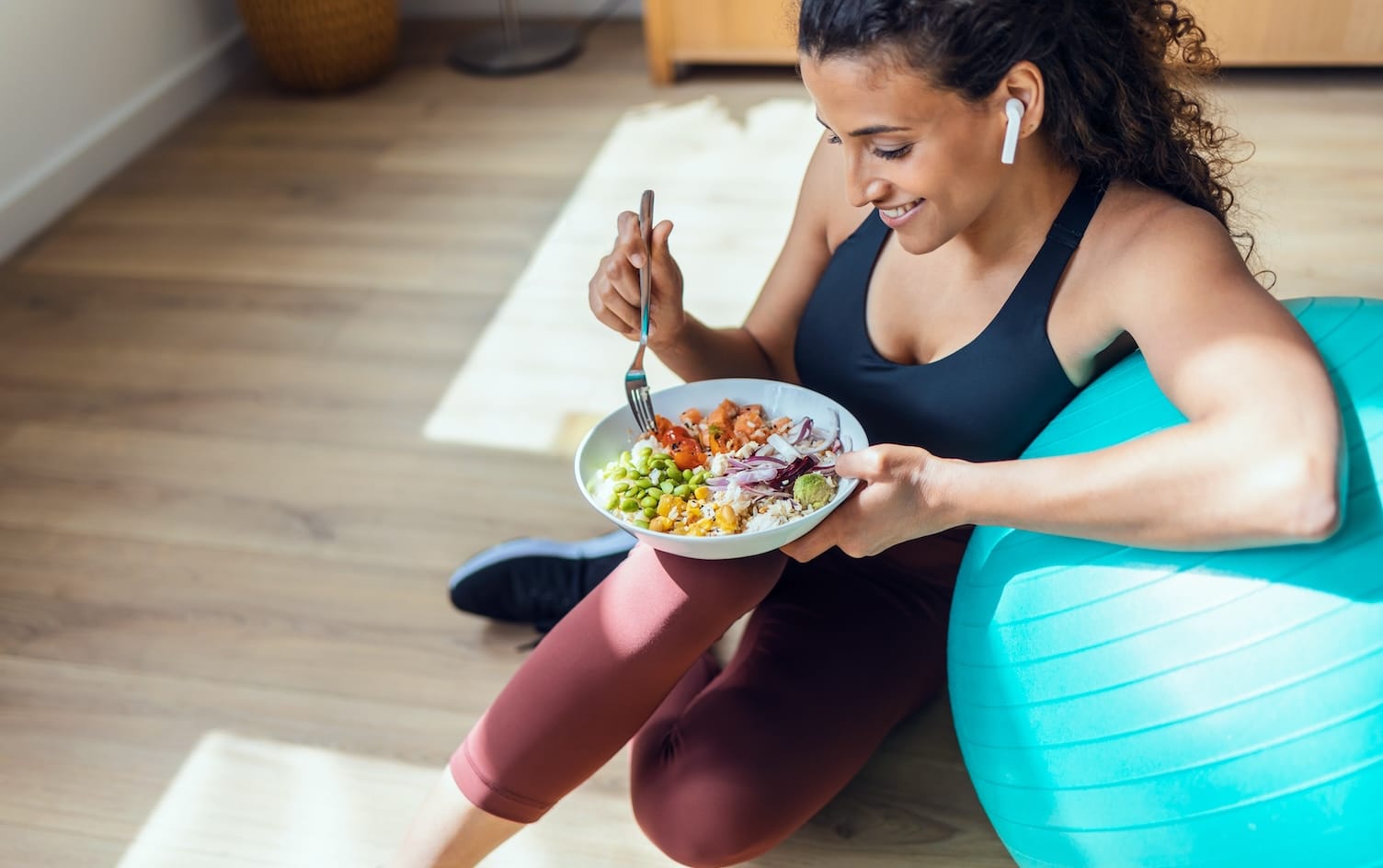As a nutrition scientist who’s an expert on how food affects the human body, MyFitnessPal scientific advisor Dr. Nicola Guess is well-versed in all things healthy eating. So knowing all she knows about nutrition, metabolism, and disease prevention—what does she eat in a day?
For starters, she eats a primarily plant-based diet, purely for environmental reasons. Her goal is to eat in a way that has a minimal negative impact on the planet. To her, that means cutting out beef and dairy and instead consuming plant-based meat and soy milk.
The only animal-based foods she eats at home are eggs, citing that they have very low greenhouse gas emissions compared to other animal sources of protein.
Onto the specifics: We asked Dr. Guess to share a sample day in the life of a plant-based diet, from her go-to breakfast to what she eats before bed.
Disclaimer: Keep in mind that her daily diet is only meant to be used as inspiration. Everyone has different preferences and everyone’s body has different nutritional requirements, so what works for her may not work for you. We recommend picking and choosing from the below advice, and tailoring it to your own lifestyle.
Breakfast
What she eats: A cup of oats made with unsweetened soy milk and one scoop of vanilla protein powder and topped with walnuts, pumpkin seeds, grated apple, and sultanas
Why she chooses it:
Dr. Guess admits that a big reason why she eats oatmeal is because she’s been a cereal fan since she was a teen.
Oats are a healthier option than boxed cereal because they don’t have any added sugar or salt.
Plus, she adds fruits and nuts/seeds to increase the fiber content and protein powder for more satiety.
Tips for recreating this meal:
Make a mix of your favorite cereal and the toppings of your choice (dried fruit, nuts, seeds, etc.).
Dr. Guess says she keeps hers in a container so it’s ready to go and then just adds fresh fruit when it’s time for breakfast.
If you’re using milk, she recommends dairy milk as opposed to a plant-based alternative as dairy is higher in protein.
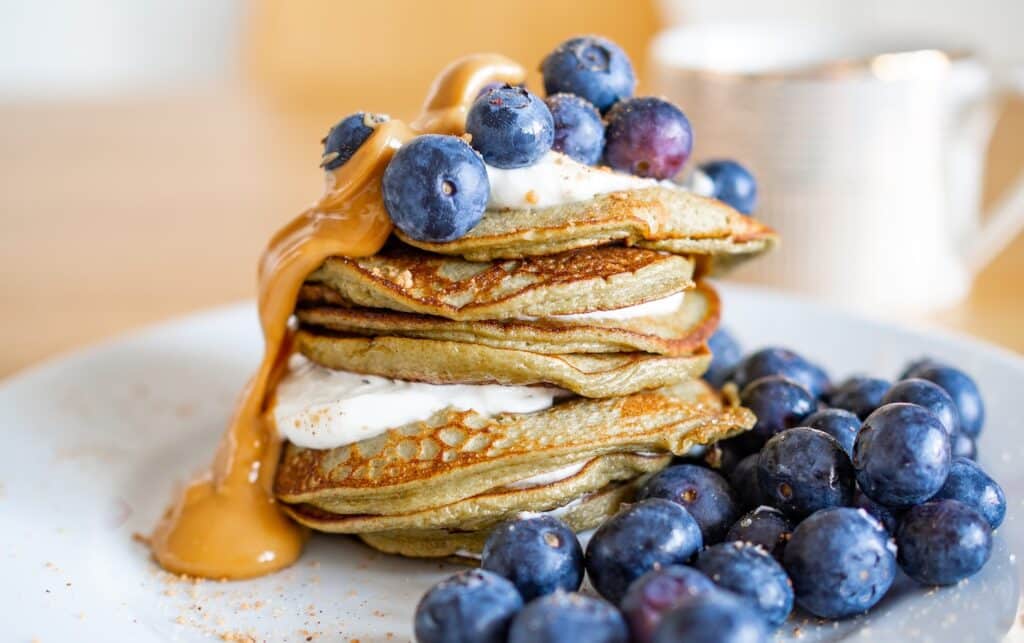
You might also like
6 High-Protein Breakfast Ideas To Keep You Energized Throughout Your Day >
Lunch
What she eats: Tofu and noodles with black beans, broccoli, red pepper, onion, ginger, and chili
Why she chooses it:
“It’s delicious, filling, nutritious and super easy to prepare!” Dr. Guess raves. It takes her less than 15 minutes from start to finish, and she can prep up to four servings for the week ahead.
Because this meal contains at least three servings of plants, it’s full of fiber and other micronutrients.
The tofu also provides around 25 percent of her daily iron requirement, while the vitamin C in the red pepper and broccoli helps her body better absorb said iron.
Tips for recreating this meal:
To save time, Dr. Guess recommends starting with ready-marinated tofu and tossing on whatever veggies you like. Then mix it up with spices and sauces—even if you use an “ultra-processed” packet of chow mein sauce.
“This meal contains so much goodness in the whole plants and legumes, a small amount of “processed” sauce makes no meaningful difference,” she says.
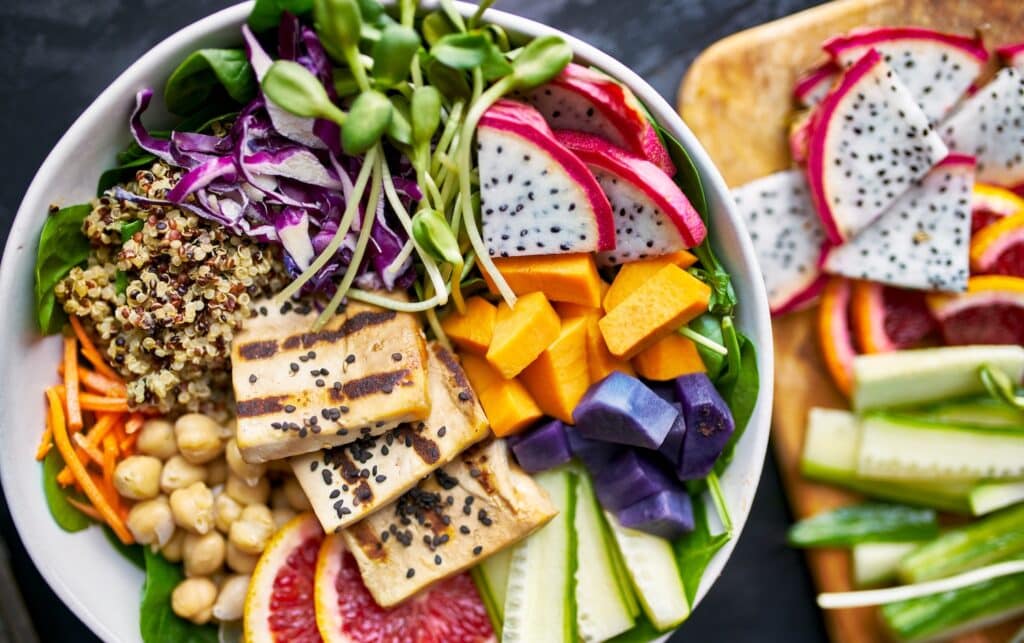
You might also like
7 Delicious Ways to Use Tofu Under 430 Calories >
Afternoon Snacks
What she eats: Bananas and protein shake
Why she chooses it:
“If I’m going to the gym to do a weights session, I like to make sure I have enough energy to get the most out of it—especially if it’s a heavy leg day!” she explains.
If she doesn’t have a banana, she’ll opt for dried apricots, which are a good source of iron.
Tips for recreating this meal:
“Fruit in general is a great snack if you’re hungry,” says Dr. Guess. “As for the protein shake, I simply blend protein powder and water together.”
Note: According to Dr. Guess, added protein isn’t necessary unless you’re doing a lot of weight training or endurance exercise.
Dinner
What she eats: Plant-based meatballs, butter beans, zucchini and spaghetti in homemade tomato sauce with nutritional yeast sprinkled on top
Why she chooses it:
Because Dr. Guess works out fairly intensely 5 to 6 days a week, she needs ample calories and protein to help her body recover. This meal contains three servings of plants for fiber and pasta for carbohydrates, along with 25 grams of plant-based protein.
But what really makes it special is the nutritional yeast. “Nutritional yeast is a great addition to this type of plant-based meal because it has a kind of cheesy taste, and just 2 teaspoons gets me above my daily requirements for key B vitamins, including folate and vitamin B12,” she explains, adding that it can be tough to get enough B12 on a plant-based diet.
Tips for recreating this meal:
Dr. Guess says that for most people, the amount of protein in her go-to dinner isn’t necessary, so you could swap in butter beans for the meatballs.
You can also be flexible with the vegetables you use. She likes to add in whatever she has in the fridge so it doesn’t go to waste.
As for the sauce, she makes hers from scratch. But if you’re using a store-bought sauce, she recommends choosing one with the fewest ingredients and the lowest sugar content.
Fun fact: We offer six different meal planning guides, including ones specifically tailored to eating low-carb, vegetarian, gluten-free, dairy-free, heart-healthy, and more! Check them out.
Evening Snack
What she eats: Soy yogurt and a piece of fresh fruit
Why she chooses it:
“This is just to make sure I get enough calories to sustain my exercise,” Dr. Guess says, noting that the yogurt gives her a bit more calcium and protein.
In terms of the fruit—which she eats for a few more plants in her diet—she sticks to 1 to 2 passion fruits or 3 to 4 large strawberries.
It’s not necessarily a nightly occurrence, either. “If I’ve eaten enough for dinner, I’ll skip the snack.”
Tips for recreating this meal:
“About 125 ml of yogurt and a piece of fruit before bed can help you maintain glycogen stores and improve recovery, especially if you’re an athlete,” Dr. Guess explains. “However, unless you have high energy requirements, there’s no need to deliberately eat another snack before bed.”
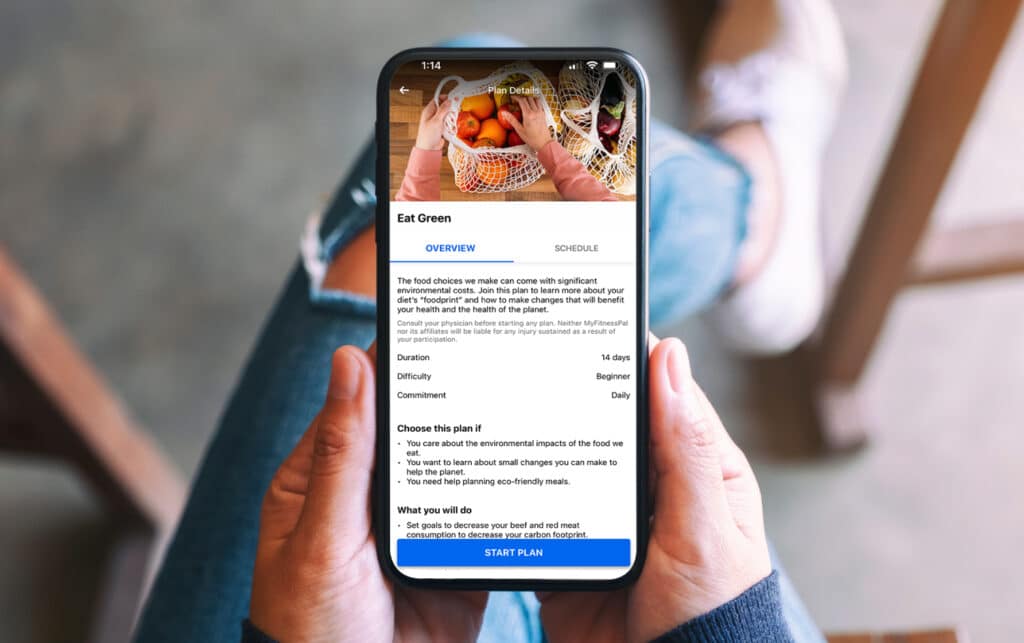
You might also like
Learn How to Eat Green With Our FREE In-App Plan >

